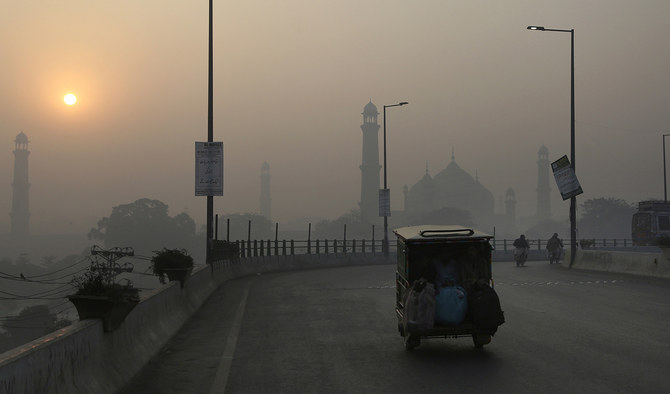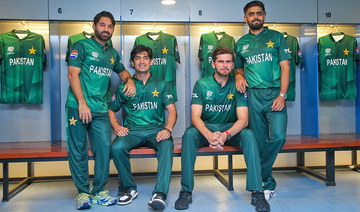WASHINGTON: Thick, smoky air from Canadian wildfires made for days of misery in New York City and across the U.S. Northeast this week. But for much of the rest of the world, breathing dangerously polluted air is an inescapable fact of life — and death.
Almost the entire world breathes air that exceeds the World Health Organization's air-quality limits at least occasionally. The danger grows worse when that bad air is more persistent than the nightmarish shroud that hit the U.S. — usually in developing or newly industrialized nations. That's where most of the 4.2 million deaths blamed on outdoor air pollution occurred in 2019, the UN's health agency reported.
“Air pollution has no boundaries, and it is high time everyone comes together to fight it,” said Bhavreen Kandhari, the co-founder of Warrior Moms in India, a network of mothers pushing for clean air and climate action in a nation with some of the world's consistently worst air. “What we are seeing in the U.S. should shake us all."
“This is a severe air pollution episode in the U.S.,” said Jeremy Sarnat, a professor of environmental health at Emory University's Rollins School of Public Health. "But it’s fairly typical for what millions and millions of people experience in other parts of the world.”
Last year, nine of the 10 cities with the highest annual average of fine particulate matter were in Asia — including six in India, according to air quality company IQAir, which aggregates readings from ground level monitoring stations worldwide.
Fine particulate matter, sometimes denoted as PM 2.5, refers to airborne particles or droplets of 2.5 microns or less. That’s far smaller than a human hair, and the particles can reach deep into lungs to cause eye, nose, throat and lung irritation and even affect heart function.
Sajjad Haider, a 31-year-old shopkeeper in Lahore, Pakistan, rides his motorbike to work daily. He wears a mask and goggles against frequent air pollution in the city of 11 million, but suffers from eye infections, breathing problems and chest congestion that get worse as smog grows in winter.
On his doctor's advice, he relies on hot water and steam to clear his chest but said he cannot follow another bit of the doctor's advice: Don't go out on his motorbike if he wants to keep his health.
“I can't afford a car and I can't continue my business without a motorbike," said Haider.
Last year, Lahore had the world's highest average concentration of fine particulate matter at nearly 100 micrograms per cubic meter of air. By comparison, New York City’s concentration hit 303 at one point on Wednesday.
But New York's air typically falls well within healthy levels. The U.S. Environmental Protection Agency’s standard for exposure is no more than 35 micrograms per day, and no more than 12 micrograms a day for longer-term exposure. New York’s annual average was 10 or below the past two years.
New Delhi, a heaving city of more than 20 million where Kandhari lives, usually tops the list of the many Indian cities gasping for breath as haze turns the capital's sky gray and obscures buildings and monuments. It's worse in autumn, when the burning of crop residues in neighboring states coincides with cooler temperatures that trap deadly smoke over the city, sometimes for weeks.
Vehicle emissions and fireworks set off during the Hindu Diwali festival add to the murk, and the results include coughs, headaches, flight delays and highway pileups. The government sometimes asks residents to work from home or carpool, some schools go online and families that can afford them turn to air purifiers.
On Thursday, even as a hazardous haze disrupted life for millions across the U.S., New Delhi still ranked as the second-most polluted city in the world, according to daily data from most air quality monitoring organizations.
Kandhari, whose daughter had to give up outdoor sports over health scares related to the bad air, said the air pollution is constant but policymakers only seem to notice its most acute moments. That has to change, she said.
“We should not compromise when it comes to access to cleaner air,” Kandhari said.
On Thursday, AccuWeather gave nations ranging from Egypt to Senegal a rating of purple, for dangerous air quality. It was the same rating given this week to New York and Washington, D.C.
Senegal has suffered unsafe air for years. It's especially bad in Senegal's east as desertification — the encroachment of the Sahara onto drylands — carries particles into the region, said Dr. Aliou Ba, a senior Greenpeace Africa campaigner based in the capital of Dakar.
The Great Green Wall, a massive tree-planting effort aimed at slowing desertification, has been underway for years. But Ba said pollution has been growing worse as the number of cars on the road, burning low-quality fuel, increases.
In the U.S., the 1970 passage of the Clean Air Act cleared up many smog-filled cities by setting limits on most sources of air pollution. The landmark regulation led to curbs on soot, smog, mercury and other toxic chemicals.
But many developing and newly industrialized nations have weak or little-enforced environmental laws. They suffer increased air pollution for other reasons, too, including a reliance on coal, lower vehicle emissions standards and the burning of solid fuels for cooking and heating.
In Jakarta, capital of Indonesia, the world's fourth-most populous country, it's often difficult to find clear blue sky, with power plants and vehicle emissions accounting for much of the pollution. It's also one of the world's largest coal-producing nations.
In one apartment building in the north of the city, between two busy ports where coal is shipped and stockpiled and where factories burn more, residents tried filtering coal dust with a net. It didn't work.
“My family and I often feel itching and coughing," Cecep Supriyadi, a 48-year-old resident, said. “So, when there is a lot of dust entering the flat, yes, we must be isolated at home. Because when we are outside the house, it feels like a sore throat, sore eyes, and itchy skin.”
An Indonesian court in 2021 ruled that leaders had neglected citizens' rights to clean air and ordered them to improve it.
China has improved since Beijing was notorious for eye-watering pollution that wreathed office towers in haze, diverted flights and sent the old and young to hospitals to be put on respirators. When the air was at its worst, schools that could afford it installed inflatable covers over sports fields with airlock-style revolving doors and home air filters became as ubiquitous as rice cookers.
Key to the improvement was closing or moving heavy industries out of Beijing and nearby areas. Older vehicles were taken off the road, many replaced with electric vehicles. China still is the world’s largest producer and consumer of coal, but almost none is consumed at street level. The average PM 2.5 reading in Beijing in 2013 of 89.5 — well above the WHO’s standard of 10 — fell to 58 in 2017 and now sits at around 30. China had just one city — Hotan — in the world's top 10 for worst air.
Mexico City, ringed by mountains that trap bad air, was one of the most polluted cities in the world until the 1990s, when the government began limiting the number of cars on the streets. Pollution levels dropped, but the city's 9 million people — 22 million including suburbs — rarely see a day when air pollution levels are considered “acceptable.”
Each year, air pollution is responsible for nearly 9,000 deaths in Mexico City, according to the National Institute of Public Health. It's usually worse in the dry winter and early spring months, when farmers burn their fields to prepare for planting.
Authorities haven’t released a full-year air quality report since 2020, but that year — not considered particularly bad for pollution, because the pandemic reduced traffic— Mexico City saw unacceptable air quality on 262 days, or 72% of the year.
In the summer months, intense rains clean the city's air somewhat. That's what brought Verónica Tobar and her two children out Thursday to a small playground in the Acueducto neighborhood near one of the city's most congested avenues.
“We don’t come when we see that the pollution is very strong," Tobar said. Those days “you feel it in your eyes, you cry, they’re itchy," she said.
Her son was diagnosed with asthma last year and changes in temperature make it worse.
“But we have to get out, we can’t be locked up,” Tobar said as her children jumped off a slide.




















